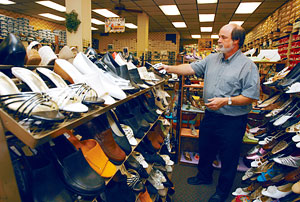Business blues
By Kenneth Fine
Published in News on July 24, 2008 1:42 PM
It might be difficult to find a seat in some downtown restaurants during the lunch hour, but many neighboring business owners said those bodies are not translating into sales.

News-Argus/Greg Sousa
Phil Bedford, owner of Family Shoe Store, Inc. in Goldsboro, stocks up on the latest fashions in women's shoes. He said his business has held steady.
Just ask Peggy Jenkins, manager of the Mission Thrift Store on Center Street.
“I mean, I’m not going under but business has slowed down a lot. Gas prices are affecting everything,” she said. “And if people only have so much money to spend, they would probably rather spend it on food.”
Before the price of a gallon of gasoline broke the $3 barrier, a typical day for Mrs. Jenkins would involve interactions with 100 customers or more.
“Now, I’m lucky if I get 50,” she said.
And some of those who do come in simply are not spending as much.
So these days, filling up the store’s 16-foot truck with gasoline hits the coffer twice as hard.
Family Shoe Store owner Phil Bedford can relate.
The number of customers he sees has not decreased much, but the increase in fuel costs has meant more expensive shoes.
In January alone, Bedford saw a 4-percent increase in shoe costs.
Still, he remains optimistic.
Just as his father, Guy, did, he said.
“We have seen trouble like this before, but things have a way of leveling out,” Bedford said. “Now, I’m not seeing any big increases in sales, but right now, we’re holding our own.”
But he admits it can be difficult to stand up to superstores like Wal-mart during tough times.
So in order to compete and survive, mom and pops have to get creative.
“You have to offer them something they can’t find at Wal-mart,” Bedford said. “Rather than give them the same pick-and-pay stuff, we try to create a niche-type thing.”
And that means offering what Bedford says you can’t find at corporate chains — a large selection of safety shoes, unique brands and sizes, physician-endorsed labels and a certain level of customer service you might not find in a shopping mall.
“Once the customers get here, if you show them good customer service — give them something extra — that keeps them coming back,” he said.
Mrs. Jenkins agrees.
She is weathering this period of economic strife by keeping a “tidy shop”, one that keeps their prices as low as possible.
Other business owners have their own methods.
At Waynesboro Home Furniture, Terry Cottle always has an eye on his expenses.
“You really have to watch them,” he said. “You have to watch them daily.”
And you have to make changes — however minor — to save money.
For him, that might mean buying less expensive tires for his trucks.
Or installing navigation devices in them to cut back on wasteful gasoline consumption.
“If you get lost, you could drive all over Wayne County looking,” Cottle said. “This way, you are always efficient.”
But more important than policies or practices, at least for Cottle, is faith.
Faith that if his business can “just survive,” a brighter future is ahead.
“If things are good for a while, they will get bad for a while,” he said. “It’s kind of like fishing. If they are biting, you will catch a heck of a lot. If they aren’t biting, you might as well not fish.”
So Cottle is biding his time, waiting for a time when people have more money to spend.
“The thing with selling furniture, you might not need that couch or that chair right now, but eventually, you’re going to need one,” he said. “You just have to wait it out. And if you can’t wait it out, get out. Complaining won’t get you anywhere.”
